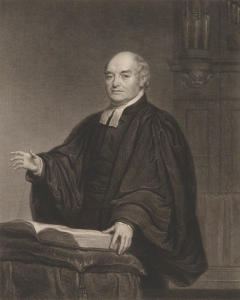Reverend John Yates

John Yates, a distinguished Unitarian minister in Liverpool, was known for his religious and abolitionist views, but less so for his secret and conflicting business interests, His entry in the Oxford Dictionary of National Biography is also silent on this aspect of his life. Interestingly, he also had family ties to the slave trade. His in-laws were members of Liverpool’s slaving elite and two of his sons were the owners of slaves in Jamaica and Trinidad.
Born in Bolton, Lancashire, Yates was the only child of a schoolmaster and received his education at Bolton Grammar School and Warrington Academy. In 1777, he began his ministry at Kaye Street Chapel, Liverpool, later serving at Paradise Street from 1791 to 1823. In 1777 he married Elizabeth Bostock (nee Ashton) a widow and wealthy heiress. Elizabeth’s father was the salt and slave trader John (Brooks) Ashton of Woolton Hall and her mother, also named Elizabeth, was a member of the Brooks slave trading dynasty that included her father (John) and 3 brothers (John Jnr, Joseph and Jonathan). The marriage proved to be extremely advantageous in significantly enhancing John Yates’ financial standing and is said to have been resisted by Elizabeth’s family. Following his marriage, he acquired an extensive land holding known as the Dingle estate bounded by Aigburth Road/Dingle Lane and extending to the foreshore of the Mersey. He resided at Dingle Head, Toxteth Park and built several properties for other family members within the Dingle Estate.
Yates attached himself to a small liberal – radical circle of nonconformists, including William Roscoe, William Rathbone Jnr and Snr and Dr James Currie, who in 1788 were listed as subscribers to The Society for Abolition campaigning for the abolition of slavery. In his ministry, Yates was known for his eloquent sermons and his commitment to social issues. In 1788, he delivered a powerful unpublished sermon condemning the slave trade, which offended many members of his congregation while showcasing his abolitionist views.
John Yates’s business interests, though kept discreet, were significant and indeed he has been described as a ‘speculative parson’. In 1801, the firm France, Fletcher and Co whose partners included slave traders Thomas Fletcher (also an Athenaeum proprietor) and Thomas France, underwent restructuring, John’s first son Joseph Brooks Yates, aged 21, entered into the partnership. Joseph’s substantial 25% share was facilitated by his father, who secretly held interests in the firm. Elaboration of this arrangement is given in Thomas Fletcher’s 1843 autobiography
‘The fact is that the Rev. Mr. Yates had from the first a secret interest in the concern. He had influence enough with Mr. France to prevail upon him to give him an eighth share, the same as mine; in consideration of which he was to advance £4,000, which was to have stood in my name, and he made the proposal to me to give my note for the £4,000, of which I was to pay him the interest and account to him for the profits’
This partnership evolved over the years, with the firm being known as France, Fletcher, Yates & Co. and later Fletcher, Yates & Co. following the death of Thomas France in 1815. By 1828, upon the expiration of the partnership between Thomas Fletcher and Joseph Brooks Yates, the latter held a majority shareholding (60%).
Joseph Brooks Yates (1780- 1855) was the owner of slaves across several plantations in Jamaica. When slavery was finally abolished in 1834 he made a total of 18 separate claims for compensation and was awarded £43,000 for 2,287 enslaved persons.
His brother John Ashton Yates (1781-1863) became a Whig politician and was similarly awarded £2214 for 46 enslaved persons in Trinidad.
The Yates family generally were known for their philanthropy and support for learned Societies/Institutions. A further brother Richard Vaughan Yates (1785 – 1871) was the donor of Princes Park to the inhabitants of Liverpool; he too made a claim for compensation when slavery was abolished, but his claim was rejected.
Sources
https://www.ucl.ac.uk/lbs/firm/view/-1915911825 – Frances Fletcher and Co
https://www.ucl.ac.uk/lbs/person/view/21522 – Joseph Brooks Yates
https://www.ucl.ac.uk/lbs/person/view/21522 – John Ashton Yates
Autobiographical Memoirs of Thomas Fletcher of Liverpool (Privately printed 1843)